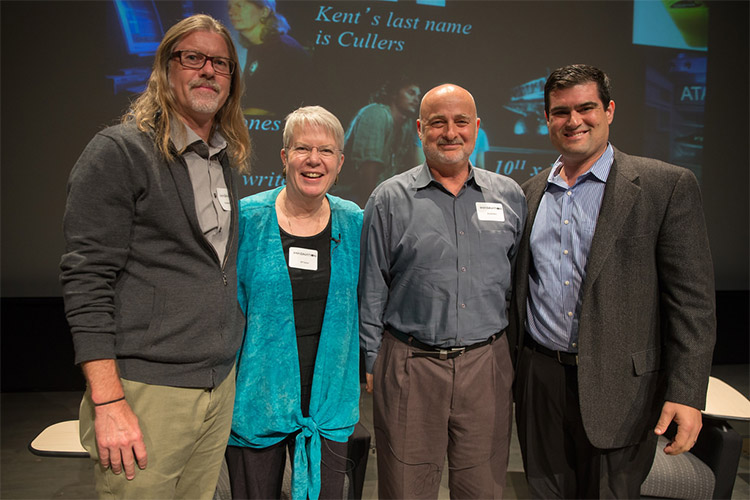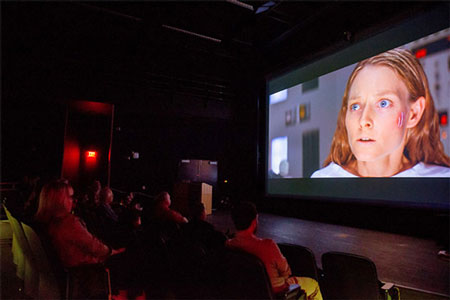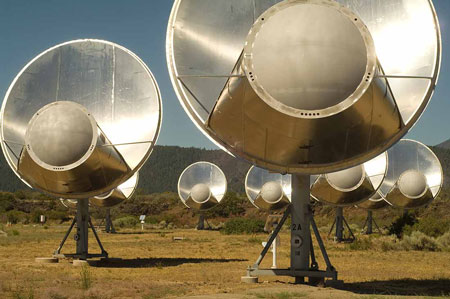Division Helps Launch Campus Science Fiction Film Series
Film showings paired with opportunity to meet noteworthy scientists who will explain the science behind the science fiction to high school students, community
May 16, 2014
By Kim McDonald

L-R: Sheldon Brown, Jill Tarter, David Brin, Brian Keating
Alex Matthews
An astronomer long fascinated with contacting civilizations beyond our solar system becomes involved in a government-funded project to search the heavens for extraterrestrial radio signals. When the federal government ends funding for her project, she continues the effort with private support, eventually detects the radio signal she’s been hoping for and is chosen to make the first contact with an advanced civilization.
It’s the storyline from the 1997 science fiction film “Contact,” based on the novel with the same title, which was penned by the late Cornell University astronomer Carl Sagan. But the movie isn’t entirely fictional.

Alex Matthews
The main character–astronomer Ellie Arroway, played in the film by actress Jodie Foster–is an actual radio astronomer who works for the SETI Institute in Mountain View, Calif. Her name is Jill Tarter, and she came to campus last week to launch the first of what will be a series of unique events showcasing classic science fiction films. The films will be paired with an opportunity to meet noteworthy scientists who will over the next year discuss the reality and fiction in the films after showing them to high school students and others in the San Diego community interested in learning more about science.
“The purpose is to bring San Diego students to campus to have fun watching a science fiction movie and then to understand the science behind the science fiction,” said Bill McGinnis, dean of the Division of Biological Sciences, who partnered with Sheldon Brown, director of the Arthur C. Clark Center for Human Imagination and a professor of visual arts, to initiate the innovative campus outreach program. “We’ll have scientists explain the real science that underlies these movies. While some of the science fiction is fiction, some of it is science.”
Last Thursday’s showing of “Contact” also featured a discussion with award-winning science fiction author David Brin, who received his doctorate in physics from UC San Diego and, with Tarter, fielded questions from the audience following the film screening. The following evening Tarter gave an hour-long presentation about why searching for extraterrestrial intelligence is so critical to our own civilization. The talk was part of the 13th Annual James R. Arnold Lecture, named after one of UC San Diego’s founding chemistry professors and the first chair of the department of chemistry and biochemistry.
Since funding for NASA’s Search for Extraterrestrial Intelligence program was ended in 1993, Tarter has focused her efforts on designing and building the Allen Telescope Array, a recently commissioned group of radio telescopes near Mt. Lassen in northern California, privately financed by the SETI Institute, which is continuing to search for signals from advanced civilizations. The prospect that she’ll find a signal is bolstered by the fact that since January of 2013, NASA’s orbiting Kepler Telescope has already discovered nearly 1,000 planets surrounding nearby stars that can presumably support life.

Allen Telescope Array
SETI Institute
“I’m reminded of the line in ‘Contact,’ that ‘they should have sent a poet, because this is poetry’ ” Tarter said to the audience, while displaying a video of the hundreds of orbiting star systems with habitable planet systems identified by the Kepler Telescope.
Such events, combining classic science fiction films with compelling speakers who are also real scientists, are what McGinnis and Brown hope to repeat over the next year. The two campus leaders set out independently to initiate science-fiction movie outreach programs earlier this year, and when they learned of one another’s plans, decided to join forces and collaborate on a campus-wide effort. McGinnis obtained a $10,000 grant from the Ray Thomas Edwards Foundation of La Jolla to help underwrite the program, which will be operated by the Arthur C. Clark Center for Human Imagination, supported by a founding partnership with ViaSat.
The center’s next event in June will feature the 1968 science fiction film “2001: A Space Odyssey” and a discussion with actor Keir Dullea, who portrayed astronaut David Bowman in the film, and Fredrick Ordway, a space scientist and part of the production team for the movie. In August, the center will feature the 1997 science fiction film “Gattaca.” For detailed information and to register to attend these and future events, go to imagination.ucsd.edu
